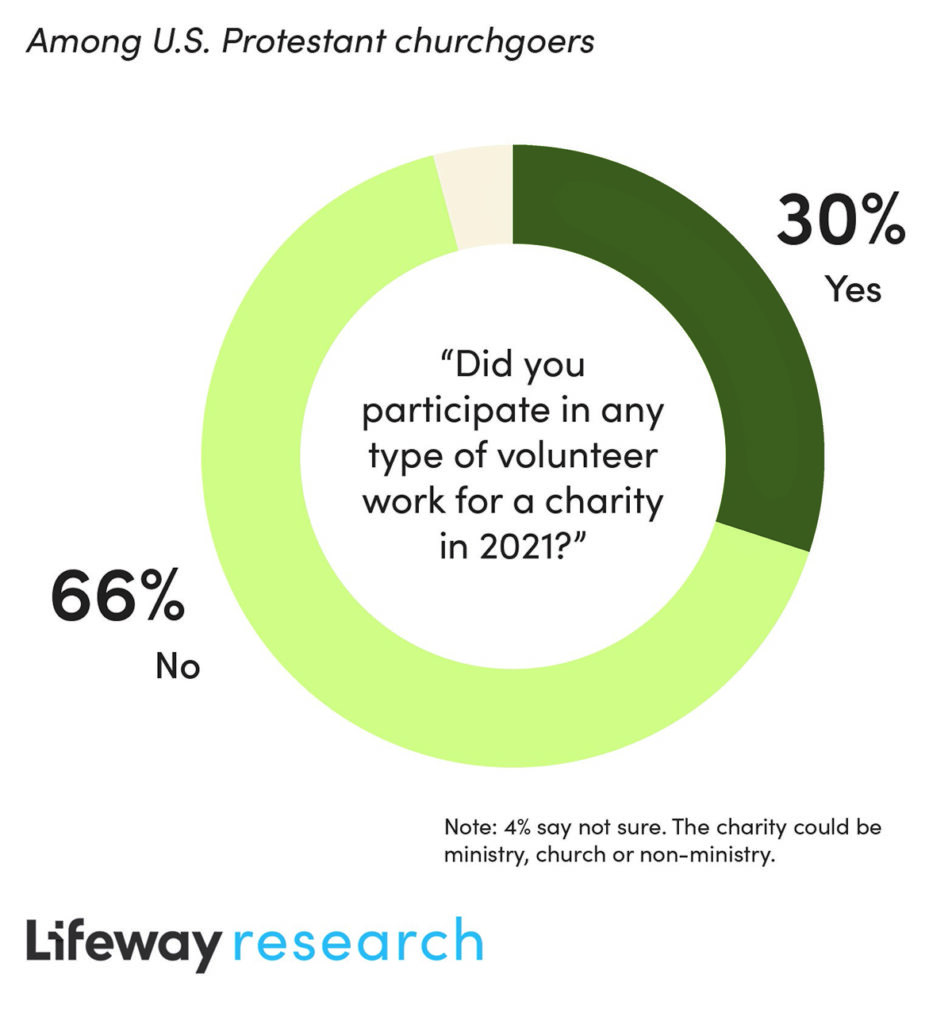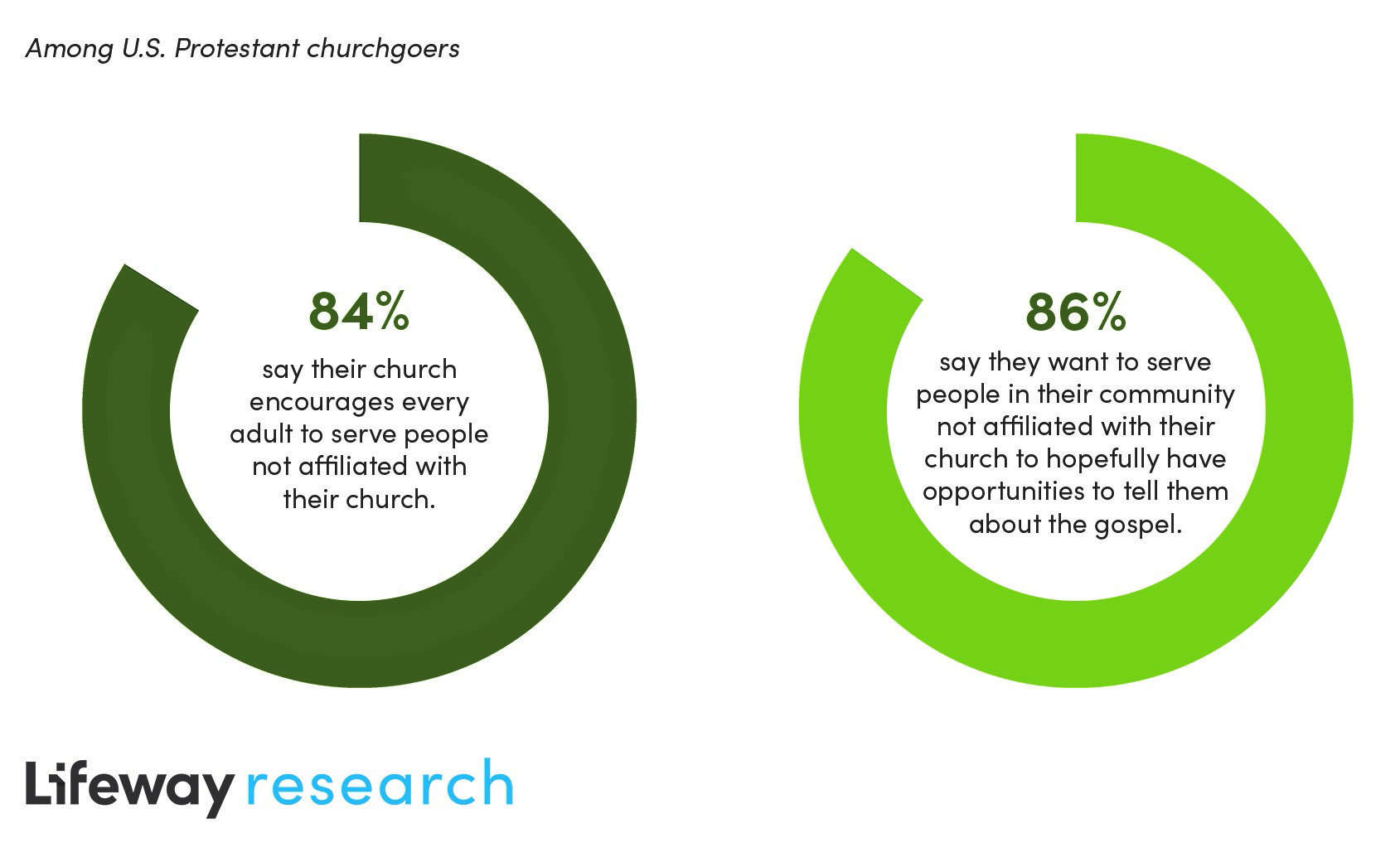BRENTWOOD, Tenn. (Special and local reports) — Although most churchgoers say they want to serve in their wider communities for Gospel impact, there is a noticeable gap when it comes to the number who actually follow through.
Protestant adherents recently surveyed by LifeWay Research, a division of LifeWay Christian Resources in Nashville, admit their churches encourage them to serve people not affiliated with their church (84%) and that they want to do so (86%) — but few have volunteered in the past year.
Two-thirds say they have not volunteered for a charity (ministry, church, or non-ministry) in the previous year. Thirty percent say they have, and four percent are not sure. According to the latest findings of the U.S. Census Bureau, 23% of Americans volunteered through an organization between September 2020 and September 2021.

“The easiest way to serve others is when a charity or group organizes the effort,” said Scott McConnell, executive director of Lifeway Research. “They recognize the need, come up with a plan, and often gather needed resources.
“You just have to show up. Churchgoers say they want to, but less than a third showed up to help a charity in the previous year,” he pointed out.
In another 2022 Lifeway Research study, Protestant pastors said churchgoers were more likely to serve in the church than in the community. Pastors estimated, on average, 42% of their adult churchgoers were involved with regular responsibilities at their churches.
Pastors in the earlier survey estimated an average of 27% of adult churchgoers were involved in serving in the community.
Gap between desire and action
Although younger churchgoers ages18-34 (91%) and 35-49 (91%) are more likely than those ages 50-64 (84%) and older than 65 (79%) to say they want to serve people in their community who are not affiliated with their church, churchgoers over the age of 65 are the most likely to say they participated in any type of volunteer work in the previous year (40%).
Denominationally, Methodists are the most likely to say their churches encourage them to be involved in ministry that serves community members not affiliated with the church (98%) and among the most likely to say they want to do this in hopes of sharing the Gospel (95%).
Still, Methodist churchgoers are the most likely to say they did not participate in any volunteer work in the previous year (88%).
“This study did not measure service churchgoers may have done individually for their neighbors. Meeting such needs as they arise is a great form of service,” McConnell said, “but some of the most widespread needs in communities require volunteers working together, something that the majority of churchgoers don’t do over the course of a year.”
A similar gap between desire and action exists for Christians sharing their faith, according to a 2022 Evangelism Explosion study conducted by Lifeway Research.
More than nine out of 10 self-identified Christian adults in the U.S. say they are at least somewhat open to having a conversation about faith with a friend, and around four out of five feel similarly about speaking about faith with a stranger.
Yet in the past six months, only 53% had a conversation about faith with a loved one and only 40% had a conversation about faith with a stranger.
Although many factors may contribute to this gap, pastors identified one in a 2021 Lifeway Research study that may play a role in churchgoers’ hesitation to get involved in both evangelism and community service: comfort. Sixty-seven percent say comfort is a modern-day idol that has significant influence in U.S. churches.
Cultivating commitment
Theological beliefs and frequency of church attendance contribute to the likelihood of community service outside of the church, according to the latst survey.
Those who attend a worship service at least four times a month are more likely than those who attend one to three times a month to want to serve people in their communities (88% v. 82%).
The most frequent church attendees are also the most likely to have volunteered in the past year (37%).
Additionally, the most recent survey indicated those with evangelical beliefs are more likely than those without to have a desire to serve those in their communities in capacities unaffiliated with their churches (90% v. 83%) and to have done so in the past year (37% v. 25%).
“Service is contagious. When you are regularly participating in the life of your church, people you get to know will ask you to serve with them,” McConnell said. “Doing good things with friends is enjoyable and easier to find time to do.”
For more information view the complete report and visit LifewayResearch.com.








